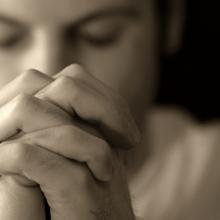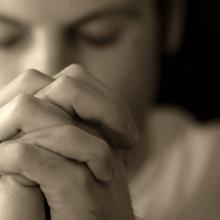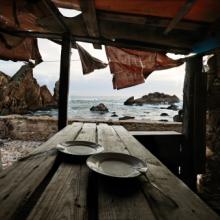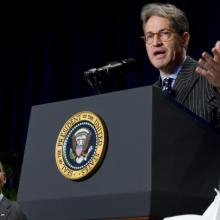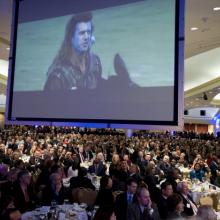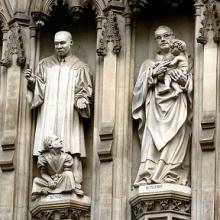Prayer
I hear people “brag” on a fairly regular basis about how little sleep they get, how many hours on end they work or how poorly they eat because of the demands of their schedules. Sorry, but this is not something to be proud of; it’s a sickness.
It’s no wonder, then, that on the rare occasion we actually slow down long enough to pray, worship, reflect or simply be in the moment, we have no idea how to do it. I watch people in church, and it’s clear from the body language that we don’t know how to slow down. I had a friend back in Texas who was so bad about overworking himself that he’d get sick every single time he took a vacation.
Some might argue this is a case for not taking time off in the first place, but that’s ignorant. Just because we can hold off the effects of frantic, disembodied living by pushing harder doesn’t mean we ever outrun the consequences.
Taken further, I think that such living is un-Biblical.
Growing up, I didn’t think my mother liked me; I know she loved me, but she didn’t know how to handle me. Mom was quiet and melancholy; I was brash and angry. Melancholy and anger were the mechanisms we each used to cope with the family’s dysfunction. But we had little in common. Well, except for the dysfunction.
But I did know my mother loved me. She said she worried about me, she wanted me to be happy; she wanted me to know Jesus. And she prayed for me every day. Every morning as I got ready for school, I passed the den and caught a glimpse of her reading her Bible and praying.
Maybe she wasn’t close to me, but I saw with whom she was close: God. Over time I saw what that friendship did to her. It made her good and kind, even in the face of disappointment and sorrow.
As an adult I tried to get closer to Mom by sharing the things that mattered to me. The first attempt didn’t go so well. I gave her a copy of my MFA thesis screenplay, which was a dark comedy about a dysfunctional family. She never read it.
it.
“I just don’t get it,” she flustered. I think she didn’t understand screenplay formatting.
Is it okay to ask God to do harm to another person? The theology of such “imprecatory prayer” may be a matter of debate, but a Dallas judge has ruled it is legal, at least as long as no one is actually threatened or harmed.
District Court Judge Martin Hoffman on Monday (April 2) dismissed a lawsuit brought by Mikey Weinstein against a former Navy chaplain who he said used “curse” prayers like those in Psalm 109 to incite others to harm the Jewish agnostic and founder of the Military Religious Freedom Foundation and his family.
Hoffman said there was no evidence that the prayers by Gordon Klingenschmitt, who had been endorsed for the Navy chaplaincy by the Dallas-based Chaplaincy of Full Gospel Churches, were connected to threats made against Weinstein and his family or damage done to his property.

Sunrise over New York City. Image via Wiki Commons (http://bit.ly/HRlswn).
I know that the sun will rise tomorrow.
With all of the scientific facts and astronomical data we are blessed with today, I can expect to wake up tomorrow and see rays of light shining through my window.
There is also no debating time. Our clocks, both digital and internal, continue to tick onward no matter the circumstances. These are inexorable certainties in life. However, these proven facts of our existence are limited. They are not the whole story.
There are things in life we neither can physically see nor explain, and yet we choose to believe anyway.
When our little siblings place their fallen teeth underneath their pillows, hoping to see a winged fairy deliver gifts in return, they are relying entirely on an unproven belief. When students choose universities to attend, they do not know what the outcomes of their decisions will be, nor can they predetermine their futures after school. But they continue to grow and experiment with life anyway.
Even the wisest of theologians and clergy have very few answers to the questions pertaining to God’s existence that enter our minds on a daily basis. All of these situations represent something many of us hold onto so dearly: Faith.
Food pantry volunteer Shirley Sears patiently walked a young woman through a series of questions on an application for emergency assistance. After they complete the form, Sears told the woman she has one more question.
"Is there anything," Sears asked, "that you would like us to pray with you about?"
Yes, the woman replied without hesitation. Reaching across the small desk that separates them, Sears grasped the woman's hands and began to pray.
That scene has been repeated thousands of times over the past 15 years inside this small, southern Indiana food pantry operated by non-profit Community Provisions of Jackson County.
This month, the practice was found to be against federal policy, leaving the pantry's founder with a Solomon-like choice: Stop the prayers or give up truckloads of free food provided through the federal Emergency Food Assistance Program.
A headline from Reuters stopped me in my tracks earlier this week.
It read, ‘"Pray for us" say Syria rebels as army closes in’." I was struck by how moving I found this statement, this plea.
I do my best to remember places of conflict and strife in my prayers, but very rarely have I been petitioned to pray from a conflict situation by those in the middle of the conflict. It may be a strange reaction on my part to conflate a headline from a news report to be a direct request for my prayers, but that is how I responded when I read it.
“Pray for me” is not an abstract or passive statement. When we are asked to pray for someone, or a group of people, we are charged to bring their need or suffering to God.
In an op-ed published today in the Charlotte Observer, Mike Daisley calls for Christians to "tone down the religious rhetoric."
Of course, the influence of religious belief on political discourse is nothing new. In the Bill of Rights, the very first phrase of the First Amendment contemplates the delicate balance of church and state. It has been challenging us ever since.
The issue of school prayer is but one example. Never mind that the Supreme Court on numerous occasions has ruled that only government-coerced prayer or state-sponsored prayer is unconstitutional. This fact has failed to dissuade numerous conservative groups from raising millions by suggesting that little Johnny could be taken away in handcuffs if the godless secularists who "outlawed prayer in schools" aren't stopped.

Foreclosure image via Shutterstock (http://www.shutterstock.com/pic-32385181/stock-photo-home-for-sale-price...)
The question is, are we listening? For God, who hears the prayers of God's people, is calling us to listen as well. God's justice is a collective project.
But when we listen, we hear stories of oppression, corruption, and injustice, in the face of honesty and hard work. But listening is not enough. When we listen, God calls us from the quiet of prayer to be a healing presence in the world.
"She looks well to the ways of her household, and does not eat the bread of idleness." - Proverbs 31:27
Editor’s Note: At 3:30 p.m. on Saturday, March 27, 2004, when I was the religion reporter for the Chicago Sun-Times, I met then-State Sen. Barack Obama at Café Baci, a small coffee shop at 330 S. Michigan Avenue in Chicago, for an interview about his faith. Our conversation took place a few days after he’d clinched the Democratic nomination for the U.S. Senate seat that he eventually won, and four months before he’d be formally introduced to the rest of the nation during his famous keynote speech at the 2004 Democratic National Conventio.
We spoke for more than an hour. He came alone. He answered everything I asked without notes or hesitation. The profile of Obama that grew from the interview at Cafe Baci became the first in a series in the Sun-Times called “The God Factor,” which would eventually became my first book, The God Factor: Inside the Spiritual Lives of Public People, in which Obama and 31 other high-profile “culture shapers” — including Bono of U2, Nobel Laureate Elie Wiesel, the author Anne Rice and President George W. Bush's speechwriter Michael Gerson — are profiled.
Because of the seemingly evergreen interest in President Obama’s faith and spiritual predilections, and because that 2004 interview remains the longest and most in-depth he’s granted publicly about his faith, I thought it might be helpful to share the transcript of our conversation — uncut and in its entirety — here on God’s Politics.
~ Cathleen Falsani

Prayer image via Shutterstock (http://www.shutterstock.com/pic.mhtml?id=46427416)
In fact, President Obama, himself, had a puzzled look as he said, “Hello Eugene.” So, I had to introduce myself to him and explained to him that I was a pastor here in Seattle and involved with some other work. We chit-chatted briefly about stuff but there is something I very specifically remember and I don’t know if I’ll ever forget this portion of our conversation.
I shared with President Obama that I occasionally but regularly prayed for him and this is how he responded:
“Thank you, Eugene. I really appreciate that. Can you also please pray for my wife and children? Pray for their protection.”
His demeanor changed. Perhaps, this is just me. Perhaps, I’m reading and analyzing too much into all the non-verbal cues but then again, I’m a pastor and after 21 years of doing ministry, you develop a “pastoral sense” and I genuinely sensed his gratitude for prayer and his request for prayer for his family.
Consciously or not, when we recognize the need to step away from social media, it is because we are questioning who is in control.
If our default is to ask life’s big questions on Twitter before we offer them in prayer, then someone other than God is in control. If we "Like" what someone is doing of Facebook before we recognize everything God is doing in our lives, maybe we need a social media time-out.
Lent is the right time to realign ourselves with the fact that God should be in control in our lives.
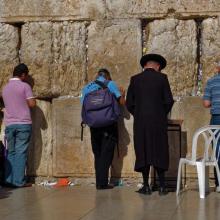
Pilgrims and tourists pray at the Wailing Wall in Jerusalem. Via Wylio http://bit.ly/wsudSt.
JERUSALEM — Every year, thousands of Americans travel abroad for less-expensive fertility treatments, hip replacements and other medical procedures. Now, an Israel-based tourism company is offering a package that combines medical care with a pilgrimage to the Holy Land.
IsraMedica plans to unveil the initiative Thursday (Feb. 16) at the National Religious Broadcasters convention in Nashville, Tenn.
Eli Knoller, the company's vice president of operations, said IsraMedica already brings about 6,000 nonmedical tourists to Israel every year, the majority of them Christian pilgrims.
In February of 2009, when I tried a month-long Ramadan fast for the book Flunking Sainthood, I felt like a failure for most of the month.
Fasting was not a practice I ever cheated on (weirdly, it was easier for me to give up food completely in February than it was just to be a vegetarian in October of that year, when I did cheat -- how lame is that?). But I never felt like I fully "got" it. I did feel unexpectedly relaxed at the end of February -- and, let's face it, a bit smug that I'd persevered through the experience -- but not much more spiritual than when I started.
I think it's because I had the wrong attitude to begin with.
It’s been several years since I’ve attended a National Prayer Breakfast, the annual event held Thursday morning in Washington, D.C., attended by the President, members of Congress, and guests — about 2,500 of them.
When I lived and worked in D.C. I attended almost every year. Senator Mark Hatfield, for whom I worked, was a faithful member of the Senate Prayer breakfast group which met weekly, and with the group in the House, sponsors the this national event.
My worry always has been that such a gathering merely sprinkles holy water on the nation’s powerful leaders without any real accountability to the prophetic message of the Gospel. As a breakfast speaker one year, Hatfield called for national repentance for arrogance and sin, referring especially to the Vietnam War. His comments broke with the normal rhetorical decorum of the event and angered President Nixon, but received widespread coverage and much respect.
These days, the early-morning prayer breakfast is also accompanied by countless luncheons, dinners, and seminars for people who come from around the nation and the world to attend. The idea behind the prayer breakfast movement is simple: Gather politicians and leaders together in a country (or state, or city) to pray with one another “in the Spirit of Jesus,” and hope that this dependence on God will transcend differences to build a movement grounded in love for one another and one’s neighbor. It’s supposed to be devoid of “politics.”
What does it mean to be a Christian when organizations such as The Family create a Jesus that does not hear the prayers of the poor? An organization that prays to the powerful in place of God? That participates in the global crucifixion of the poor by turning Jesus' cross into a social ladder for politicians to climb upwards, past the broken body of Christ? To cultivate relationships with dictators?
To cultivate the most powerful for political influence, to create an elite society for the elite, is that listening to the prayers of the people?
I ask you, was Jesus a political networker? Did he hobnob with the most powerful? Did he cultivate relationships with the dictators of his time, Herod and Pilate?
Our political class does not hear the prayers of the poor, they hear the "prayers" of corporate lobbyists who fund their campaigns. And they hear the prayers of Christians such as Doug Coe and The Family at the National Prayer Breakfast, because they offer connections, votes, and money.

"Tree of Prayer" image via Wylio http://www.wylio.com/credits/Flickr/4404284129
I know that for people of all faiths prayer is an incredibly important part of life, not only for one’s own sense of connecting to God, but also in order to stay connected to the people around them. As social media gets further embedded in our everyday lives, this sense of who is “around” us is changing, offering an opportunity to expand our understanding and experience of community. Prayer has always been a means to cross-over bounds of geography, personal experience and other divisions in order to lift up a common hope that God’s love, hope, peace and joy will be made known and Social Media, when used well, can be a powerful means of further crossing those bounds.
“The problems of homelessness and poverty are not self-inflicted, they are the result of priorities of our society and those priorities are not centered on people but on gathering more wealth for a small number of people. Many of us [homeless people] – despite the stereotypes – drew deeply on our faith and the fact that we’re all children of God and organized ourselves. We’re homeless, not helpless. That’s why our call is to work with us and not for us.”
— Willie Baptist, Scholar-in-Residence The Poverty Initiative at Union Theological Seminary
Sojourners' CEO Jim Wallis visited Chicago's North Park University today to march with students, faculty, and staff to form a “Human Circle of Protection” at the North Park Friendship Center. Jim shared his thoughts with Covenant Media Services after the march.
"We are saying, 'God is watching how you decide to cut a deficit,'" Wallis said." A deficit is a moral issue. But how we cut it — what we do, who suffers, who bears the pain of it — is a moral issue too."
Watch video of Jim's intervirew with Covenant Media inside.
This is true of any bad news, really. When I feel sick. When I don’t get my way. When I’ve had a bad day. You name it. If it’s negative, then I look forward to sharing it. I don’t mean to; I just do.
I sense this is normal, but it doesn’t make it right.
Arizona won a significant victory last week when Russell Pearce, author of Senate Bill 1070, lost in a first-ever recall election.
It was not without great effort. I’ve since been reflecting on the lessons of the work and how we traveled from the darkness of SB1070 to the hope we feel today.
The Rev. Martin Luther King Jr. and Archbishop Oscar Romero are our heroes. They shared much in common: Both ultimately were focused on being obedient to God and his call on their lives and as such they were both, first, ministers of the Gospel. King and Romero were fixated on justice — in love with poor people and hurting communities. Both searched for middle ground while others stayed safe inside comfortable margins; both were agents of reconciliation.
And, finally, both were martyred for their message.
Yet Romero and King have a seeming discrepancy I want to explore.
Romero called us to take the long view; King discussed the fierce urgency of now.
Romero essentially prays: Trust God, be faithful. King preaches: now is the time, act forcefully.


